It’s been two decades since Facebook first launched in 2004. Since then, the company has grown into a social media giant with billions of users worldwide. Facebook remains one of the most widely used social media sites among adults in the United States.
But it’s also had its controversies, including those related to politics. Facebook was widely criticized for how it handled misinformation leading up to the 2016 U.S. presidential election. And some researchers believe its algorithm amplifies partisan divides.
This chapter explores Facebook’s connection with politics, including its prevalence on the site and users’ views of its impact on the political environment.Here are some of the key findings:
- Relationships – not politics – drive people to use Facebook. Most Facebook users (93%) say keeping up with friends and family is a reason why they use Facebook; just 26% say the same for politics or political issues.
- Relatively few people post about politics or political issues on the site. Just 11% of Facebook users say they post at least some political content there. By comparison, people are much more likely to see political content on it: 52% of users say at least some of what they see is about this.
- Facebook users have mixed views about its impact on democracy. The largest share (43%) says it has no impact on American democracy, but slightly more say it’s mostly bad (31%) than mostly good (24%) for democracy.
- Republicans on the site are more skeptical that free expression is the norm. While 71% of users think you can freely express your political views on Facebook, Republicans are more likely than Democrats to say this is not the case (35% vs. 20%). (Throughout this report, both groups include independents who lean toward each party.)
Why and how people use Facebook
Our survey explored the “why” and “what” behind how people use the platform.
Reasons for using Facebook
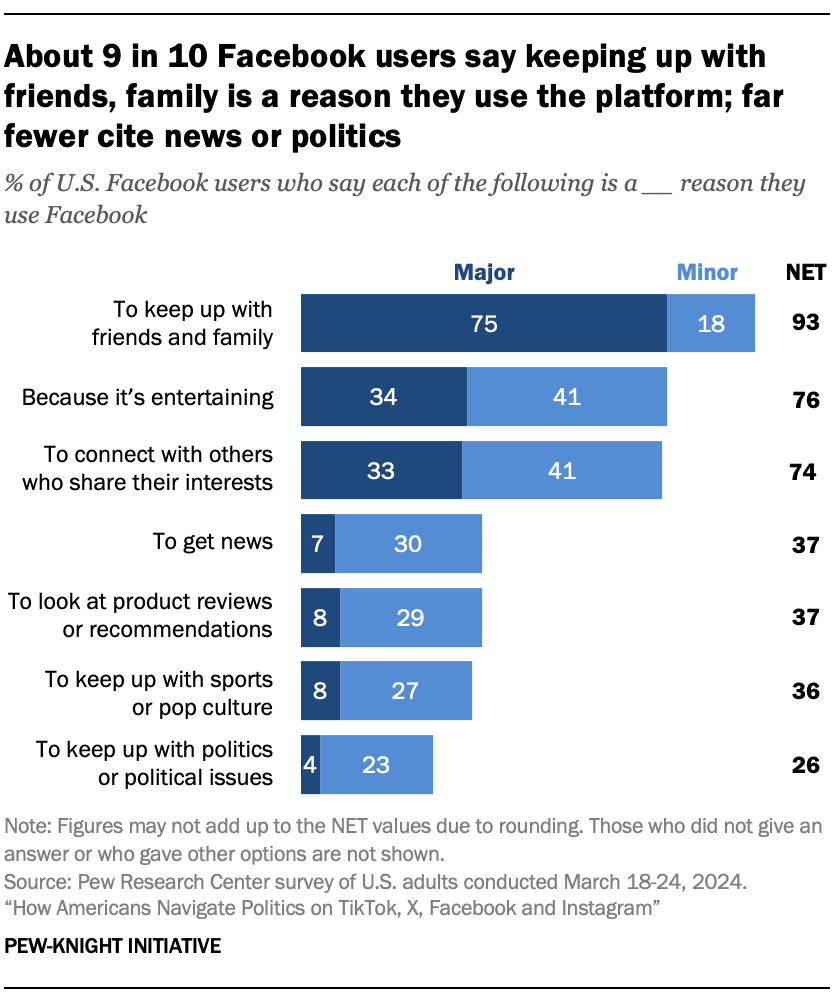
Facebook users are far more likely to cite relationships and entertainment as key reasons for using the site than news or politics.
Fully 93% of Facebook users say keeping up with friends and family is a reason why they use the site, including 75% who say this is a major factor.
Roughly three-quarters each say a reason they use Facebook is because it’s entertaining or that they do so to connect with others who share their interests.
Much smaller shares cite getting news (37%), product reviews or recommendations (37%), or keeping up with sports or pop culture (36%) as reasons for using Facebook.
Even fewer – about one quarter – say keeping up with politics or political issues motivates them to use the site.
Related: News as a reason people use Facebook
By party
The reasons people cite for using Facebook vary little by political party. For example, nearly identical shares of Republican (27%) and Democratic (28%) users cite keeping up with politics and political issues as a reason they use the site.
Seeing politics on Facebook
Several years ago, Facebook announced it would reduce the number of political posts users see in their feed. Still, about half of Facebook users (52%) say at least some of what they see on the platform is about politics or political issues.
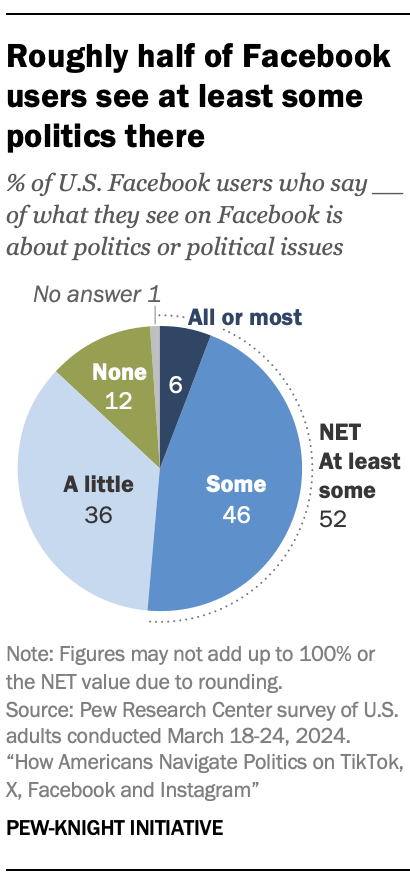
A slightly smaller share – 47% – say little to none of the content they see on Facebook is related to this.
By party
Similar shares of Republicans and Democrats who use Facebook encounter politics on the site. For example, 54% of Republican users say that at least some of what they see on Facebook is about politics or political issues, nearly identical to the 53% of Democrats who say the same.
Posting about politics on Facebook
While seeing political posts is relatively common on Facebook, posting it is not. Just 11% of Facebook users say they post or share at least some things about politics or political issues.
By contrast, about six-in-ten Facebook users say they post, but that little (15%) or none (43%) of it is about politics.
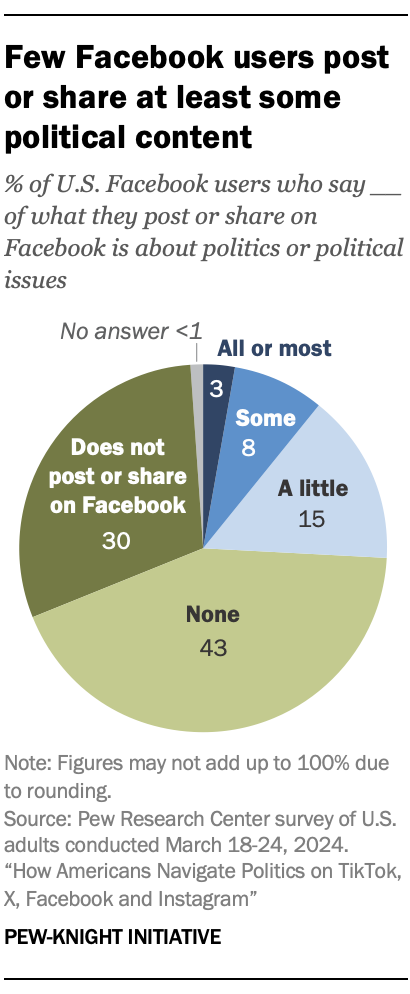
Three-in-ten don’t post or share anything on the site.
By party
Again, partisanship is not a big factor. Identical shares of Republicans and Democrats who use Facebook (12% each) report that they share at least some political content.
Why do people post about politics on Facebook?
For the 26% of Facebook users who post at least a little about politics, we wanted to understand what motivates them to do so. We asked this group about four specific reasons they might share politics-related content on Facebook.
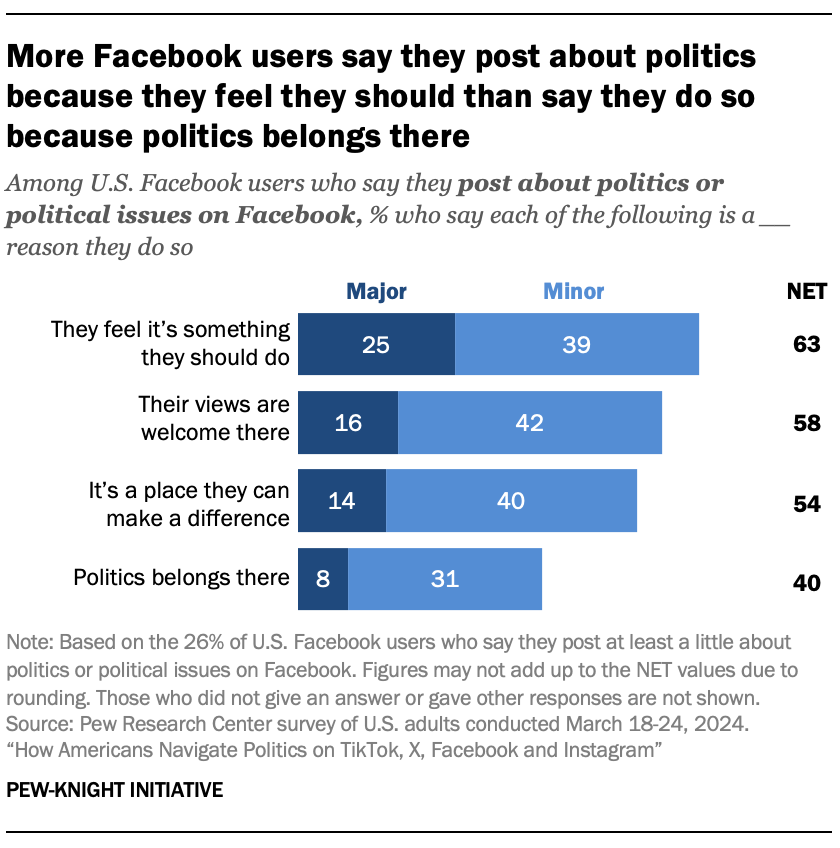
They are more likely to cite the platform as a welcoming environment for their views than as a place where politics belongs.
Among Facebook users who post about politics:
- 63% say a reason they post about this is because they feel like it’s something they should do, including 25% who say this is a major factor.
- More than half (58%) cite their views being welcome there as a factor. And 54% say it’s because they can make a difference there.
- A smaller share – 40% – say they’re motivated to do this because politics belongs on the site.
By party
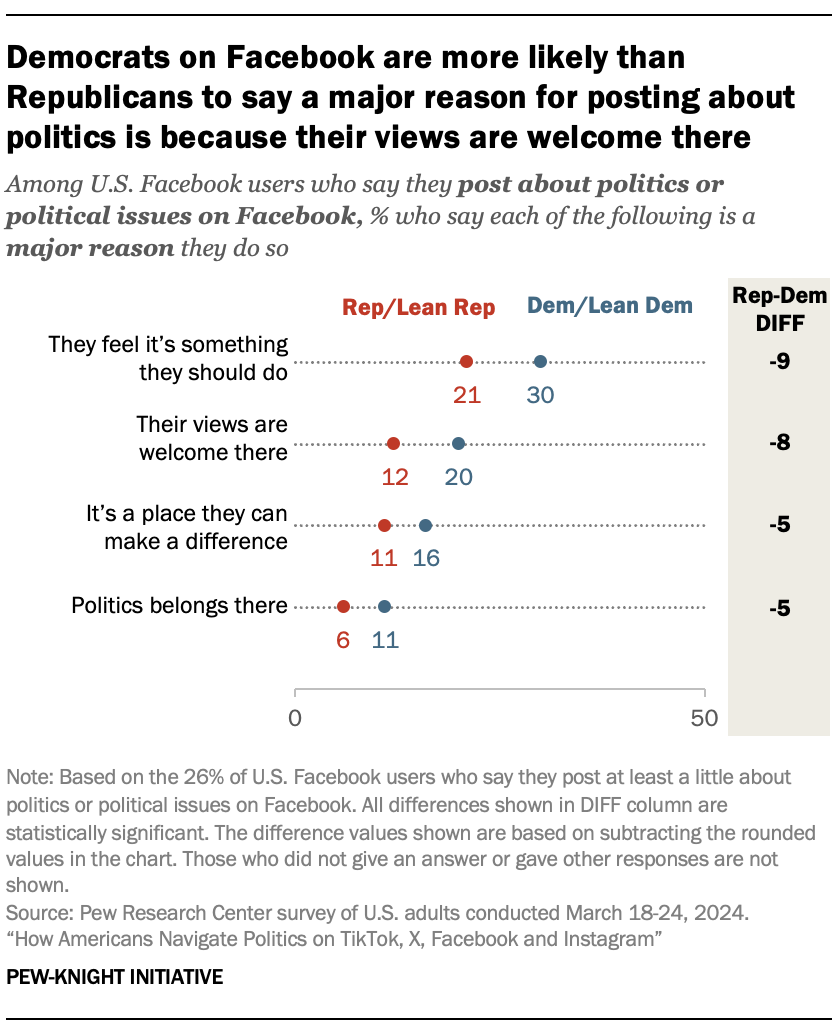
There are partisan differences in what motivates users to post about politics on Facebook.
Democrats are more likely than Republicans to say a major reason why they do so is because they feel it’s something they should do (30% vs. 21%).
And larger shares of Democrats than Republicans cite their views being welcome on Facebook, the site being a place where they can make a difference, and it being a place for politics as reasons for posting about these issues.
Why don’t people post about politics on Facebook?
There are many reasons why someone may opt out of posting about politics on Facebook, but we focused on four distinct factors for this survey.
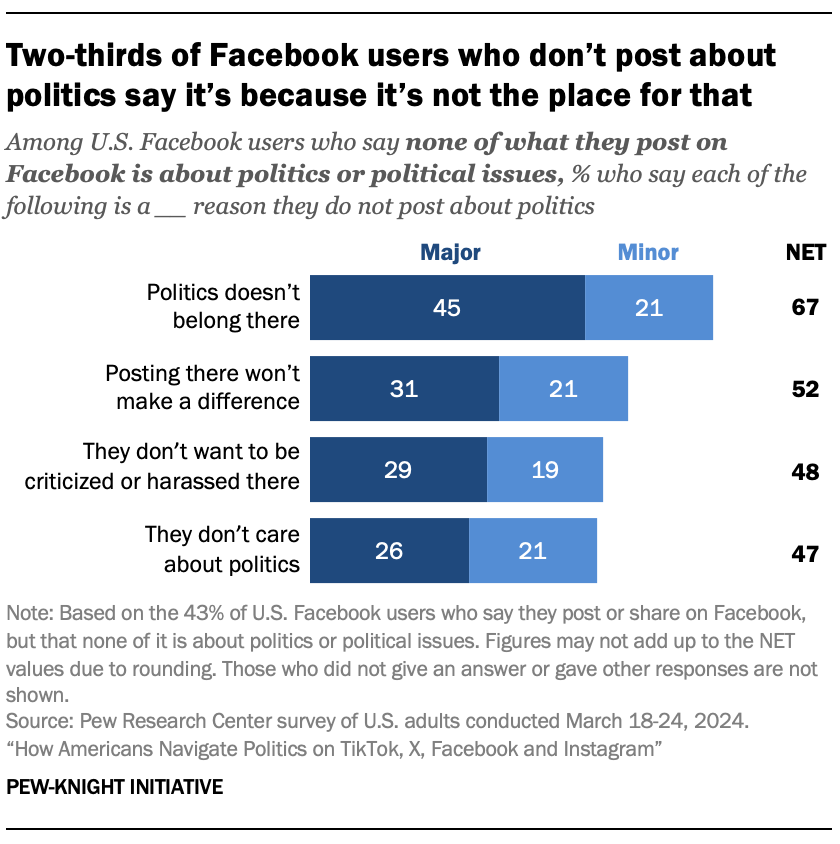
We found that a majority of these users say they don’t share political content on Facebook because they don’t think politics belongs there.
Among the 43% of Facebook users who post on the site, but never about politics:
- 67% say a reason for not posting is because politics doesn’t belong on Facebook, with 45% saying this is a major reason.
- About half say they opt not to post about politics because it won’t make a difference (52%), they don’t want to be criticized or harassed (48%) or they don’t care about politics (47%).
By party
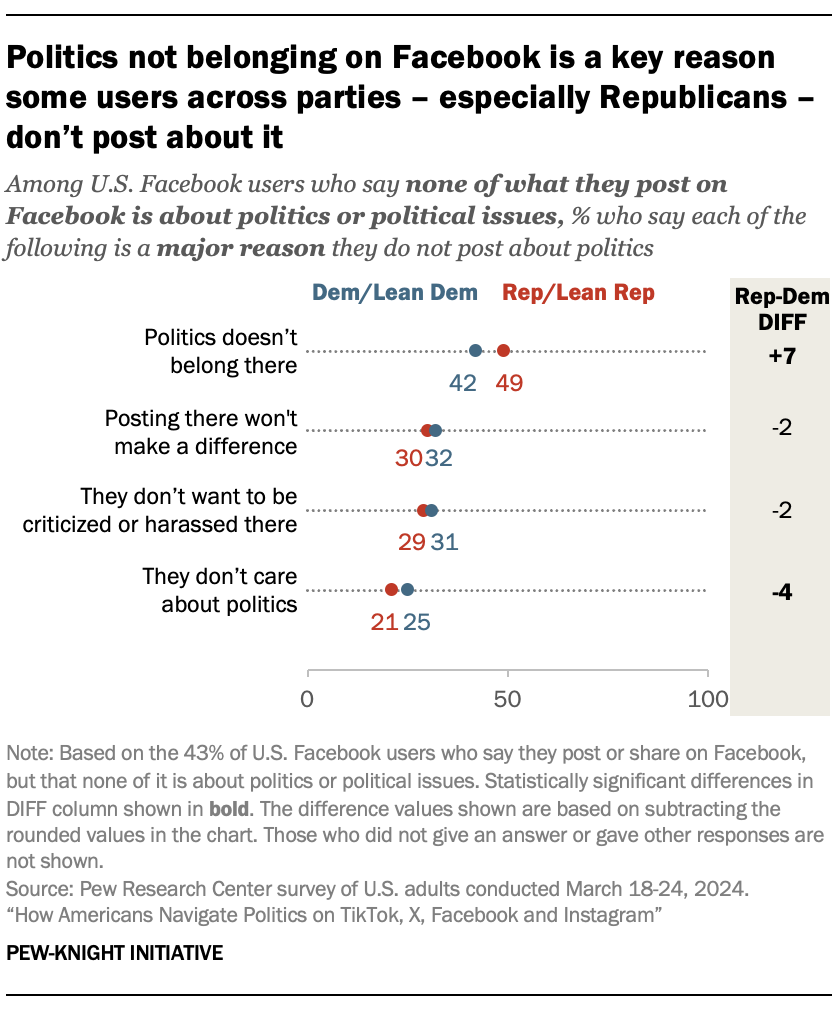
The primary reasons people don’t share about politics on Facebook vary little by party, but Republican users are more likely than Democrats to say that politics not belonging on Facebook is a major reason why they don’t post about this (49% vs. 42%).
Democrats are slightly more likely than Republicans to say a major reason they don’t post about these issues is because they don’t care about politics (25% vs. 21%).
Similar shares in both parties say they don’t post about politics on Facebook because they believe it won’t make a difference, or that they don’t want to face criticism or harassment.
How Facebook users see its climate and impact
Politics may not be the primary reason most people use Facebook, but its size and reach have made it a focal point for debates on social media’s impact on elections and partisan divides.
With that in mind, we wanted to explore its role in today’s political climate, including Americans’ views on its impact on democracy and freedom of expression.
Facebook and American democracy
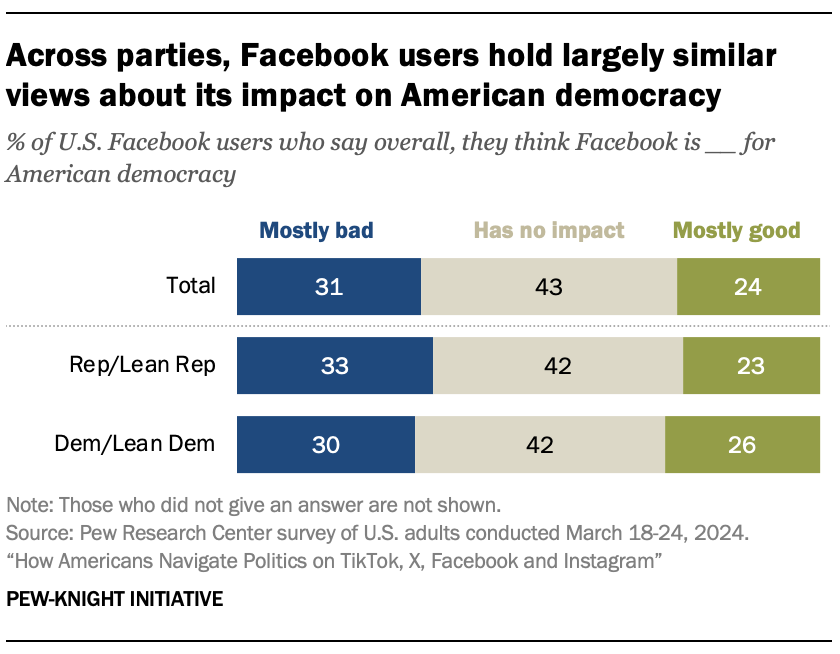
Americans have mixed views about Facebook’s impact on democracy. While more Facebook users say the site is mostly bad (31%) than mostly good (24%) for American democracy, the largest share – 43% – believe it has no impact.
By party
Republicans and Democrats who use Facebook hold largely similar views about Facebook’s impact on democracy.
A third of Republican Facebook users think the site is mostly bad for American democracy, and a similar share of Democrats (30%) say so. Another 26% of Democratic users think it’s good for democracy, and 23% of Republicans say the same.
Identical shares across parties (42% each) think Facebook has no impact on democracy in this country.
Free expression on Facebook
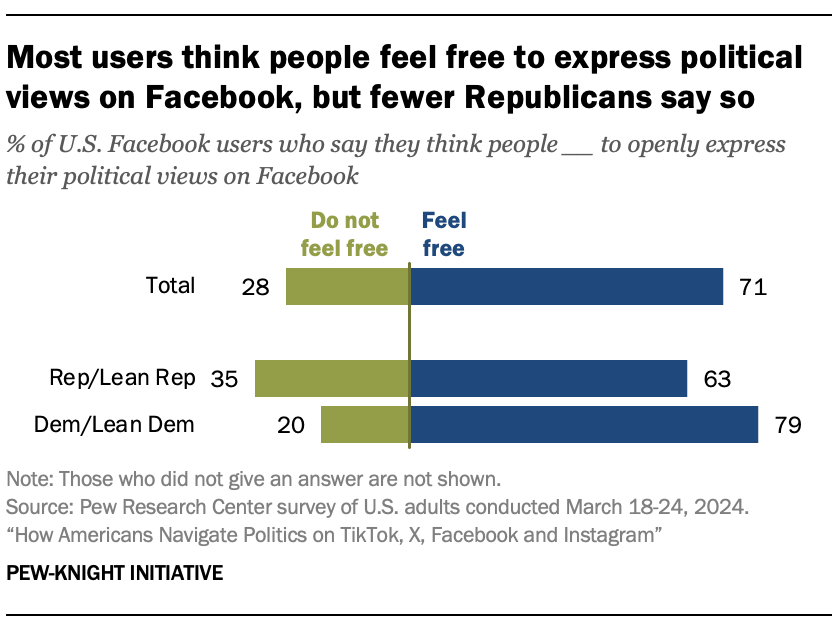
Facebook has faced criticism for what some see as stifling free speech, but we find that most users believe people can freely express their political opinion on the site.
Roughly seven-in-ten Facebook users (71%) believe people feel free to openly express their political views on Facebook, while 28% think people don’t feel free to do this.
By party
Majorities across parties think people feel free to share about politics on Facebook, but more Democrats (79%) than Republicans (63%) hold this view.
Republican users are, in turn, more likely than Democrats to say people don’t feel free to express their political thoughts on Facebook (35% vs. 20%).
Political content users see on Facebook
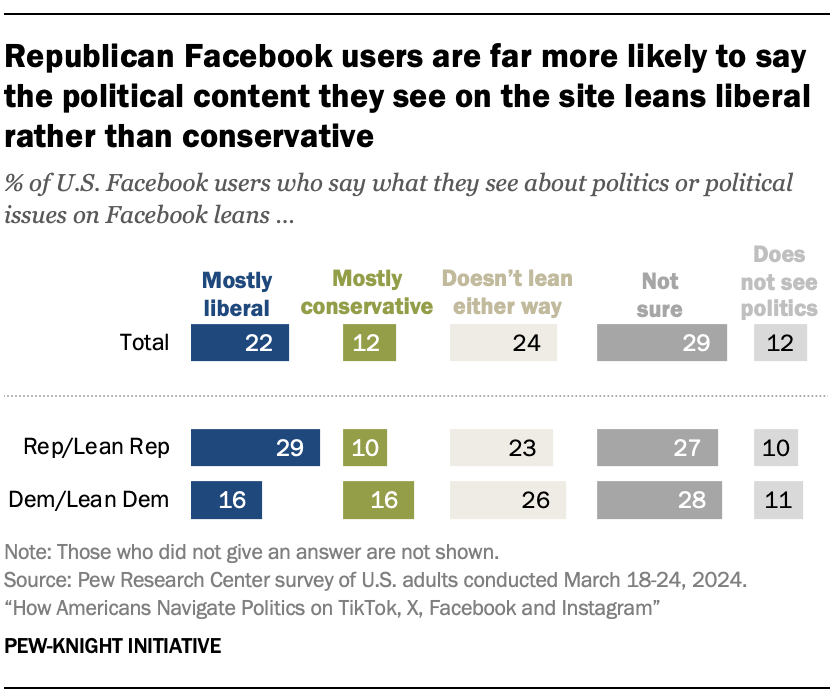
There’s no strong consensus about whether the political content people see on Facebook leans to the right or the left. But Facebook users are more likely to say they see liberal-leaning posts.
Overall, 22% of Facebook users say they see posts about politics or political issues on the site that are mostly liberal, while 12% say these are mostly conservative.
About half say the political posts they see on Facebook don’t lean liberal or conservative (24%) or that they’re unsure (29%).
By party
Republicans who use Facebook are more likely than their Democratic counterparts to say the political content they come across on the site is mostly liberal (29% vs. 16%).
By comparison, Democratic users are more likely than Republican users to say what they see about politics leans mostly conservative (16% vs. 10%).
Still, about three-in-ten users across parties are not sure how the content they see leans. Another 26% of Democrats say it doesn’t lean either way, and 23% of their Republican peers say the same.
Harassment on Facebook
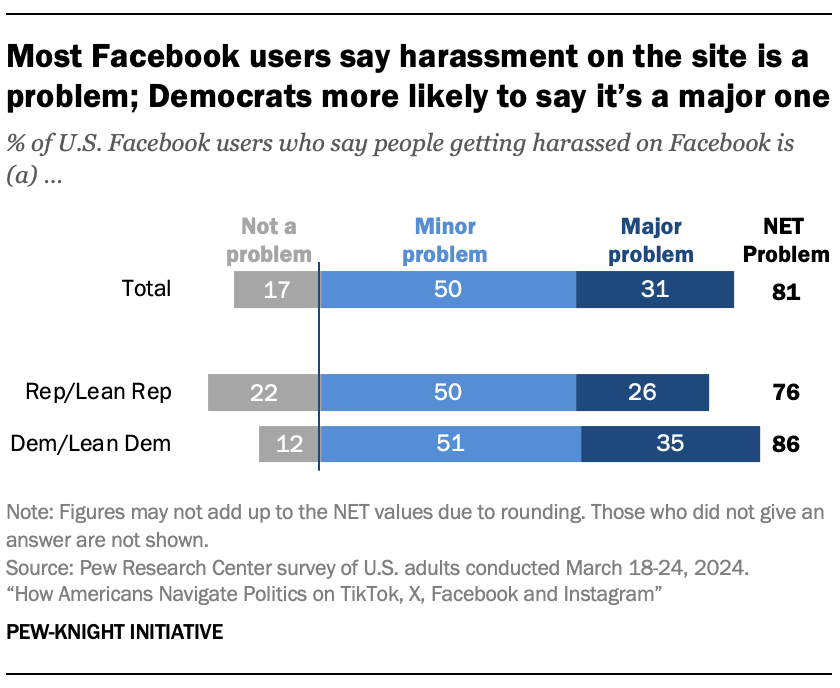
While online harassment can occur in many environments, our past research shows it’s more common on social media than on other online spaces.
Our current survey finds that users widely believe Facebook has a harassment problem. Roughly eight-in-ten say people getting harassed on the site is a major (31%) or minor (50%) problem.
By party
Most Democrats and Republicans who use Facebook think people getting harassed on the platform is a problem.
But Democrats are more likely to consider it to be a problem, including 35% who say it’s a major one. By comparison, 26% of Republican users say harassment is a major problem on Facebook.
Republican users are instead more likely than Democrats to say harassment is not a problem on Facebook (22% vs. 12%).




